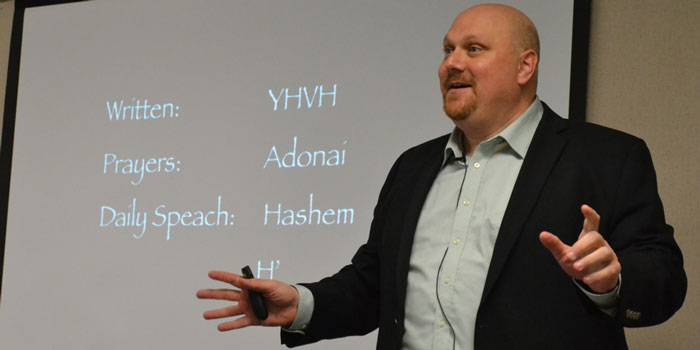Gordon Shares Knowledge Of Hebrew At Epworth Forest

Nehemia Gordon spoke today, June 19, at Epworth Forest Conference Center, focusing on the Hebrew Matthew, noting why scholars believe it was not translated from other languages’ versions. (Photo by Sarah Wright)
NORTH WEBSTER — Today, June 19, Nehemia Gordon, a Dead Sea Scrolls scholar, brought a lively, interactive program that highlighted biblical translation to Epworth Forest Conference Center. He placed special emphasis throughout the presentation on the importance that Jewish tradition and history plays in translating biblical texts. A Karaite Jew, Gordon stated at the beginning of the presentation that he believes strictly in the Old Testament; however, he added, “I’m not here to convert you. I am here to empower you with information.”
And throughout the two-and-a-half-hour presentation he shared tidbits of growing up in an Orthodox Jewish family in Chicago and how he eventually became a Karaite Jew after being confronted by the differences between the Torah and the Oral Torah. His path also led him to teach English in China for a year, earn a master’s degree in biblical studies from the Hebrew University of Jerusalem, move to Jerusalem, publish several books and podcasts while mastering Hebrew, with him joking, “People often ask me how to master Hebrew. I say first you need to be born in a Jewish family and then go to kindergarten.”
It was particularly his knowledge of Hebrew that Gordon shared, stating, “I’m bless with information and I share it with whoever wants to learn it.”
He started with the Hebrew version of Matthew 1:21, in which the angel visits Joseph with word of Mary’s pregnancy and tells him what to name the child. Within the Hebrew text, which is believed to be the original version and not translated from Greek or any other language, Gordon pointed out nuisances that are lost when translated to other languages — such as Jesus’ name, which in Hebrew is Yeshua. This then makes Matthew 1:21 read “you shall call him Yeshua for he will save (yoshia) my people …”
“This only works in Hebrew; it doesn’t work in any other language,” Gordon said, adding that in Hebrew names are extremely important.
A similar example that Gordon gave was in Matthew 28:9 when Jesus speaks after his resurrection. In the King James Bible, among other versions, Jesus says “All hail,” which Gordon pointed out is a very Greek greeting. In the original Hebrew, it is “Hashem yoshia,” which in addition to being a play on his own name, translates to “God saves.”
Gordon discussed in great detail the Jewish tradition that revolves around God’s name, particularly “Hashem” and “Yehovah.” He said Yehovah is never said aloud — rather Hashem is said in its place — or written outside the Torah since it was deemed too holy to be written, though he noted two other reasons why this might be the case: there was a Roman prohibition on the name and some people were using the name for healing, which was considered magic by rabbis. He explained that in many cases scribes would omitted vowels to prevent Karaite Jews from going against Jewish tradition and speaking the name; however, as seen in many existing manuscripts, from time to time the scribes would slip up and forget to omit a vowel.
While tracing the proper pronunciation of God’s name, Gordon found one instance where a scribe had failed to omit vowels, noting at first he practiced skepticism. However, he then found other instances, leading him to conclude that the name was pronounced “Ye HO VaH” rather than “yahweh,” which was promoted by a German scholar. And as he made this discovery, Gordon stated he was told of the first airplane hitting the World Trade Center on 9/11, followed by the second airplane hitting the second tower. He didn’t place any important significance between the two events until 10 years later when a friend suggested that maybe God had wanted his name spoken that day. Gordon also noted that St. Paul’s Chapel, which had become a refuge for people as the towers collapsed, had not suffered a single broken window, and in it, there were two instances of Yehovah being written.
Yehovah with all of its vowels intact appears all over the globe, with Gordon noting while visiting Sweden he found several instances in churches. He noted that his research on Yehovah had led him to write “Shattering the Conspiracy of Silence: The Hebrew Power of the Priestly Blessing Unleashed.”
Audience members also learned a few Hebrew words themselves with Gordon prompting sections of the room to repeat certain words after him. The presentation concluded with a question-and-answer session where audience members asked about certain pronunciations, Gordon’s experiences and more.
For information about Gordon, visit www.nehemiaswall.com.
